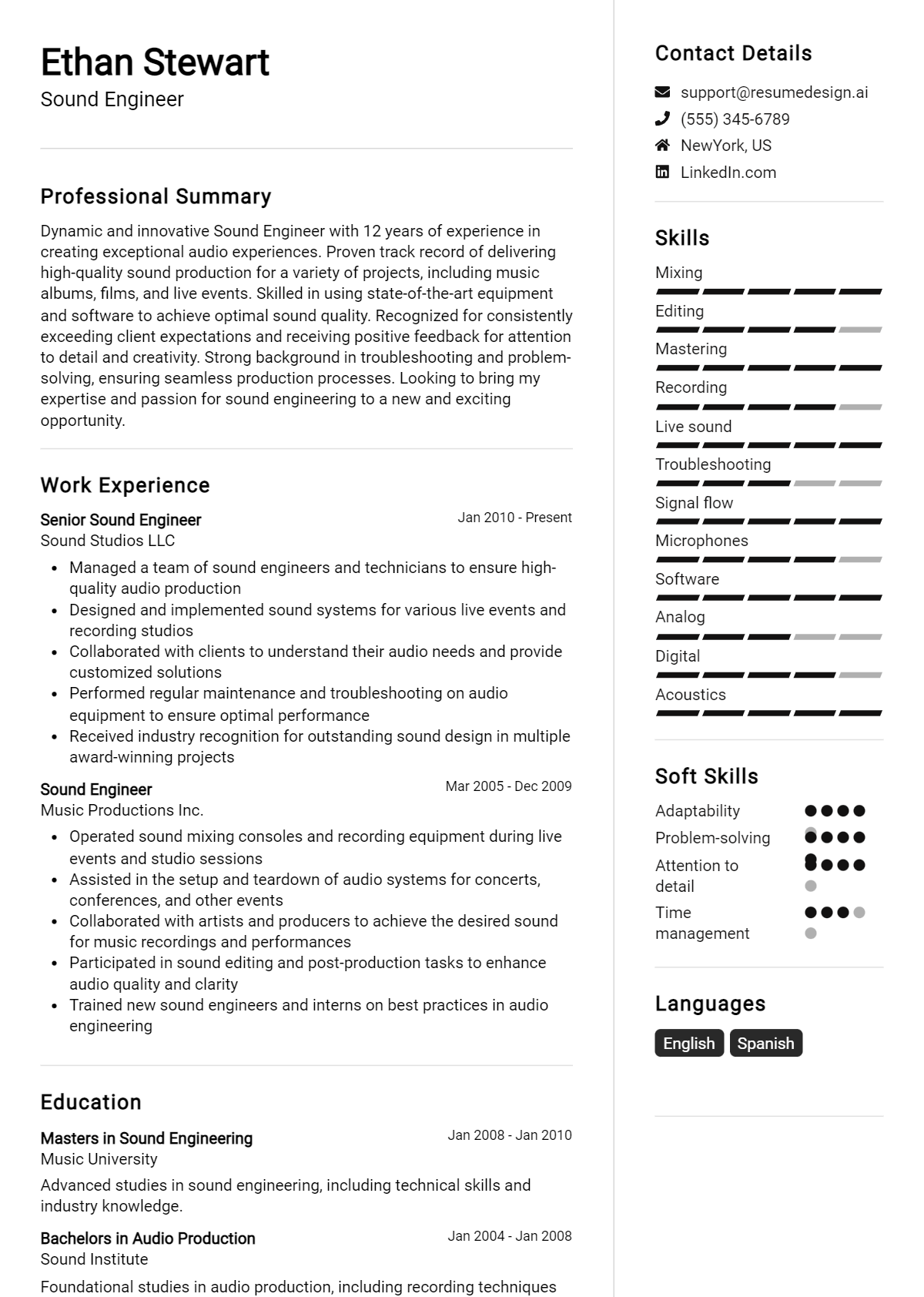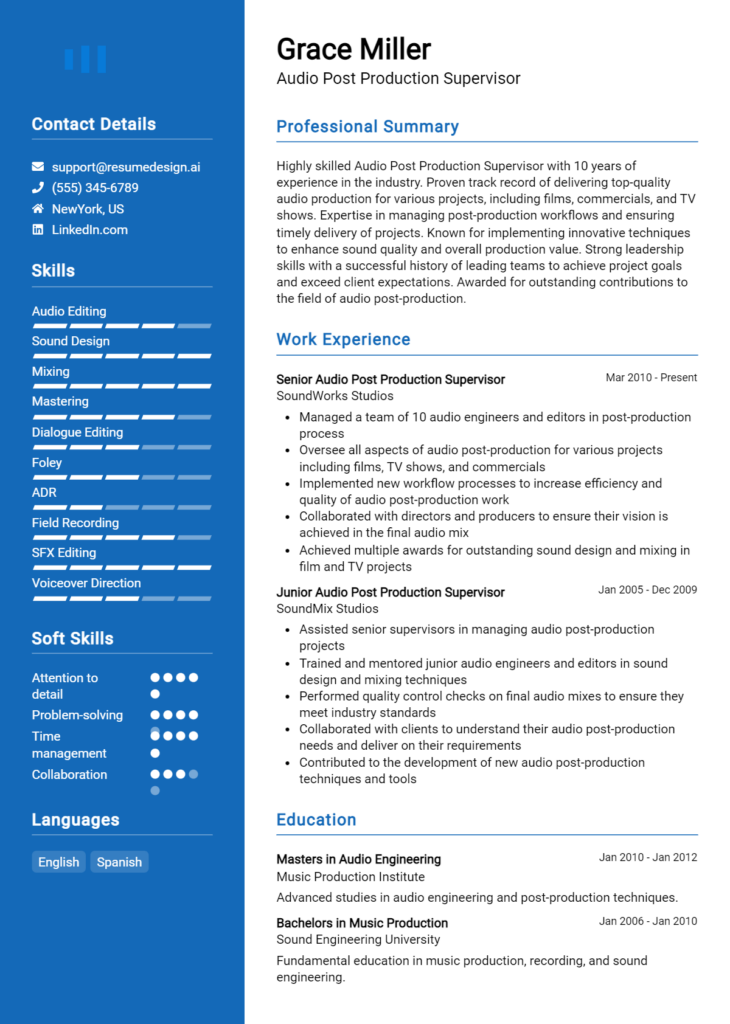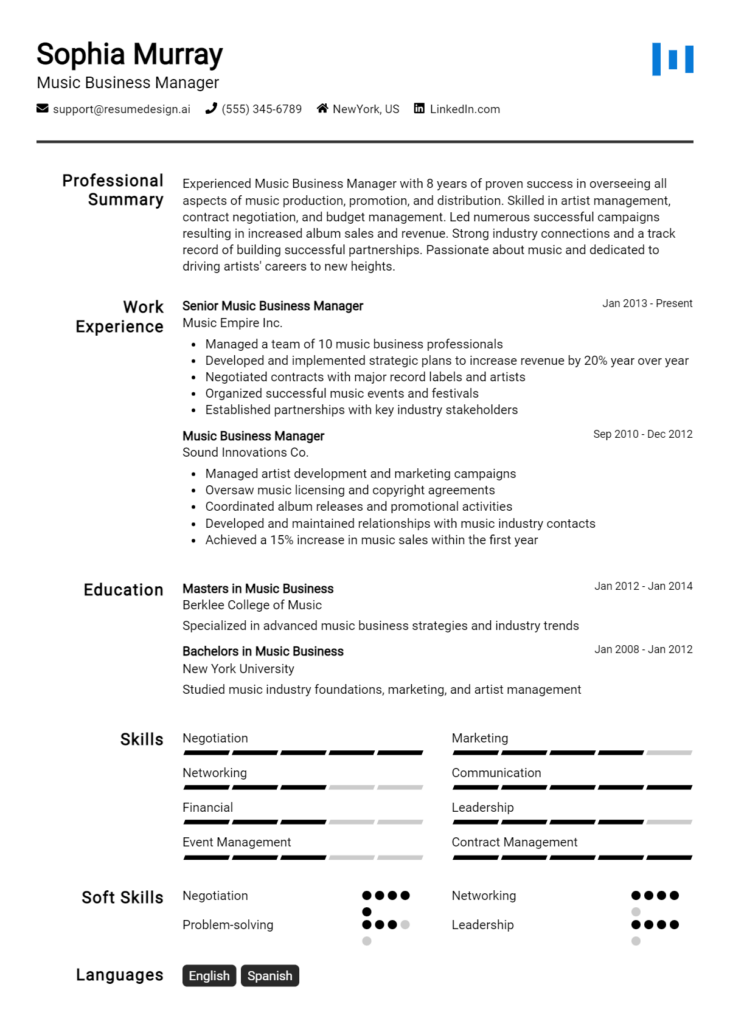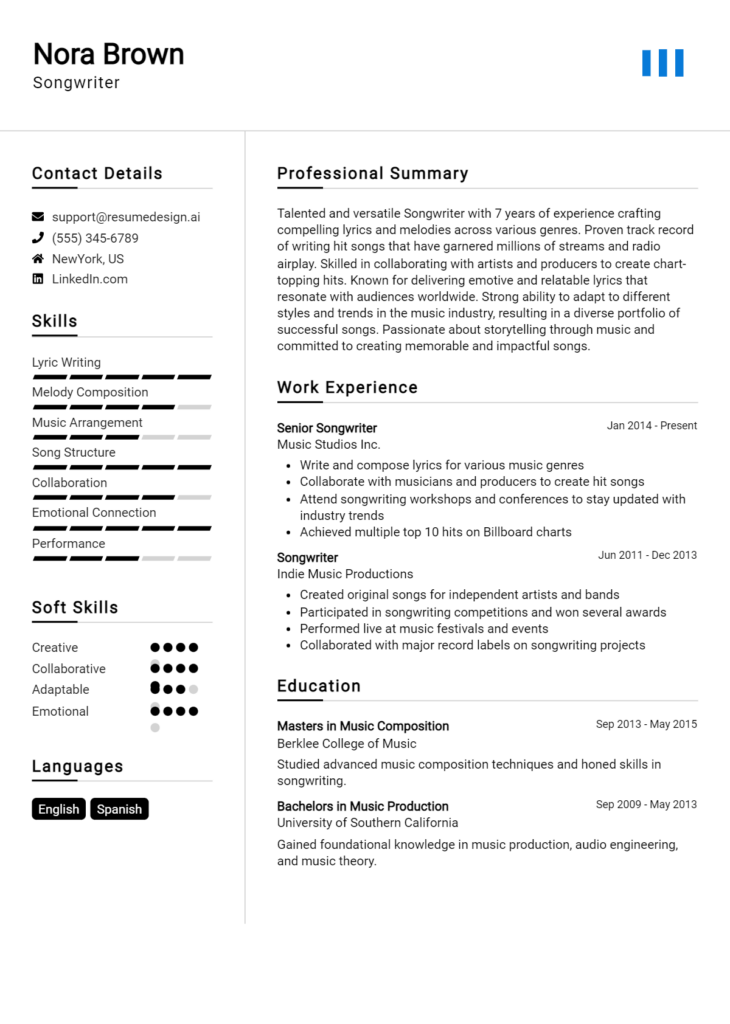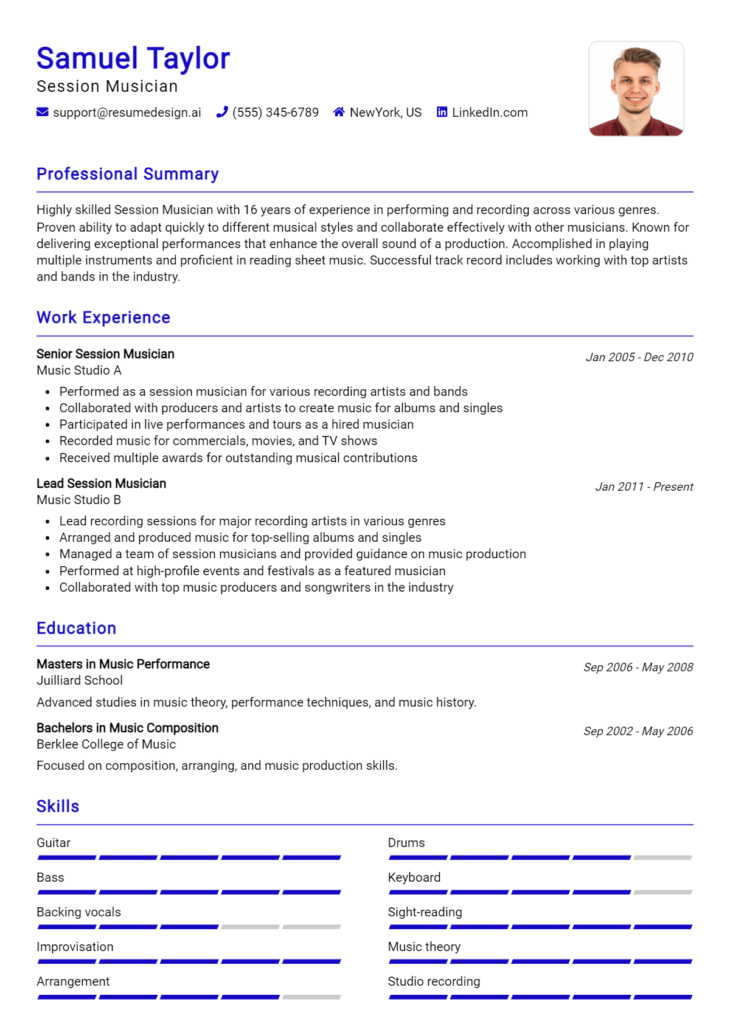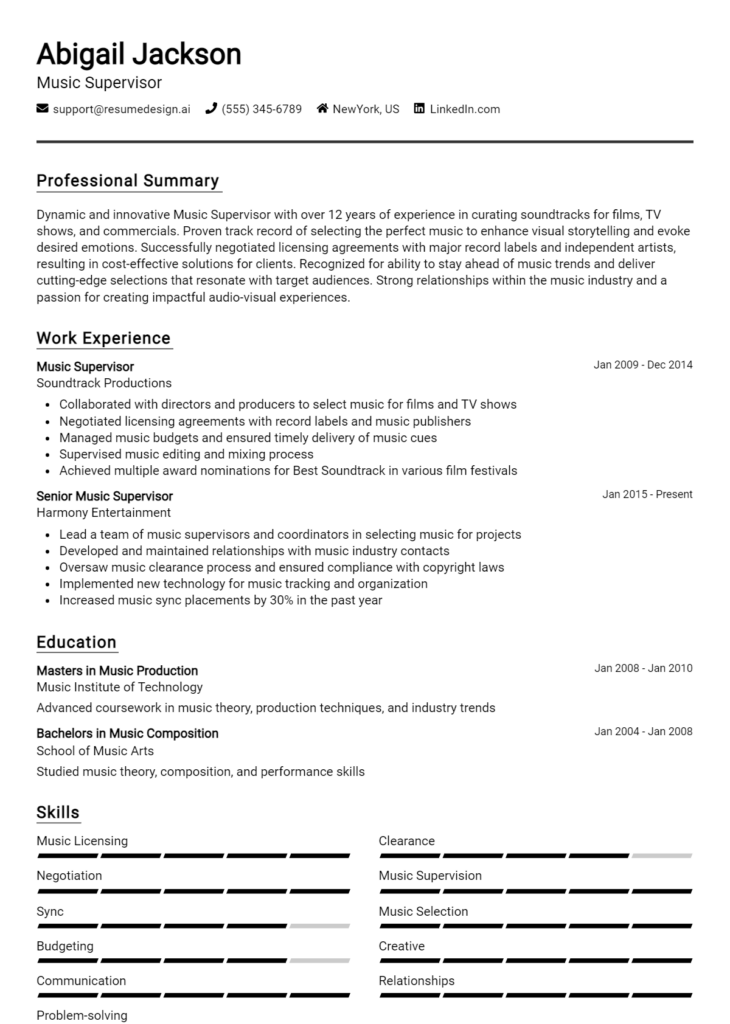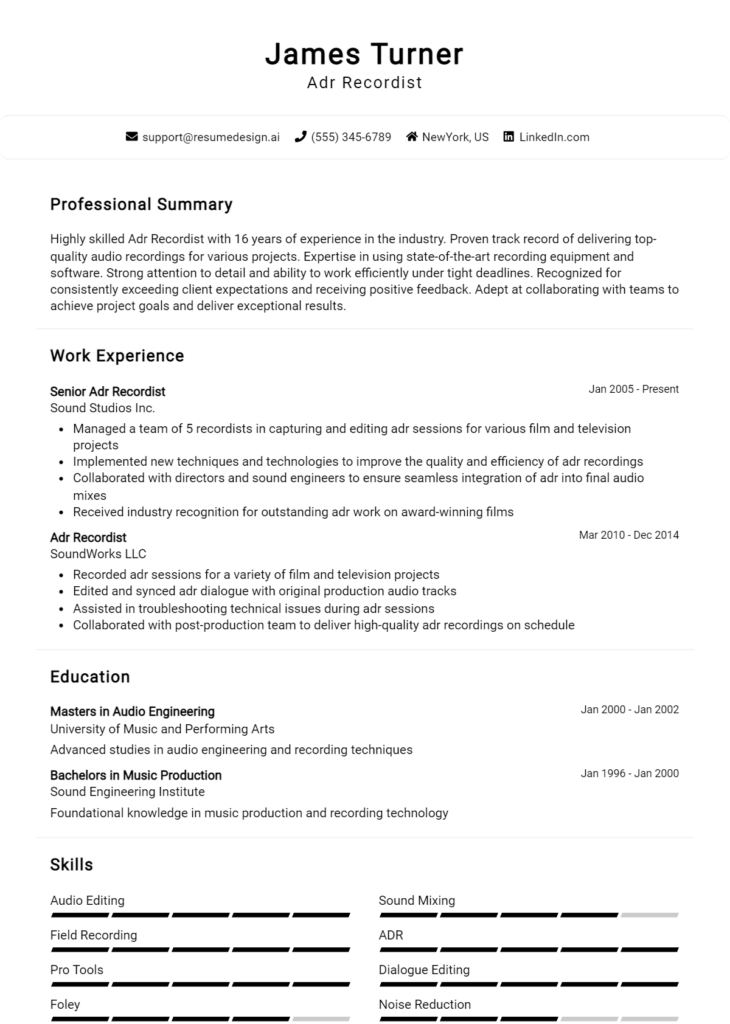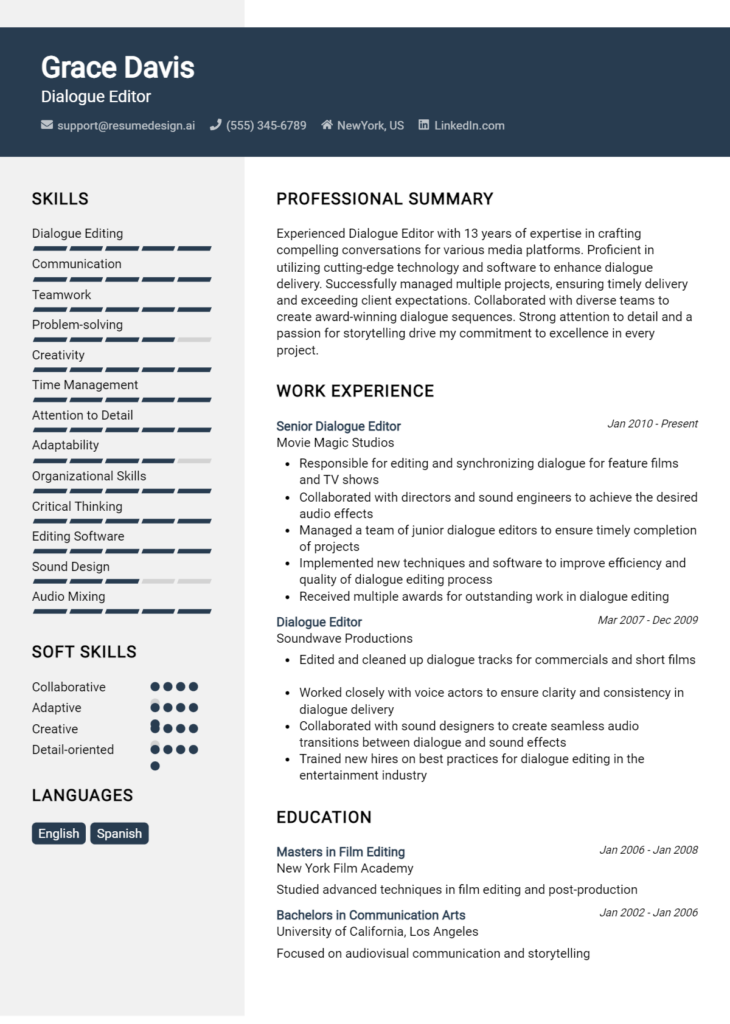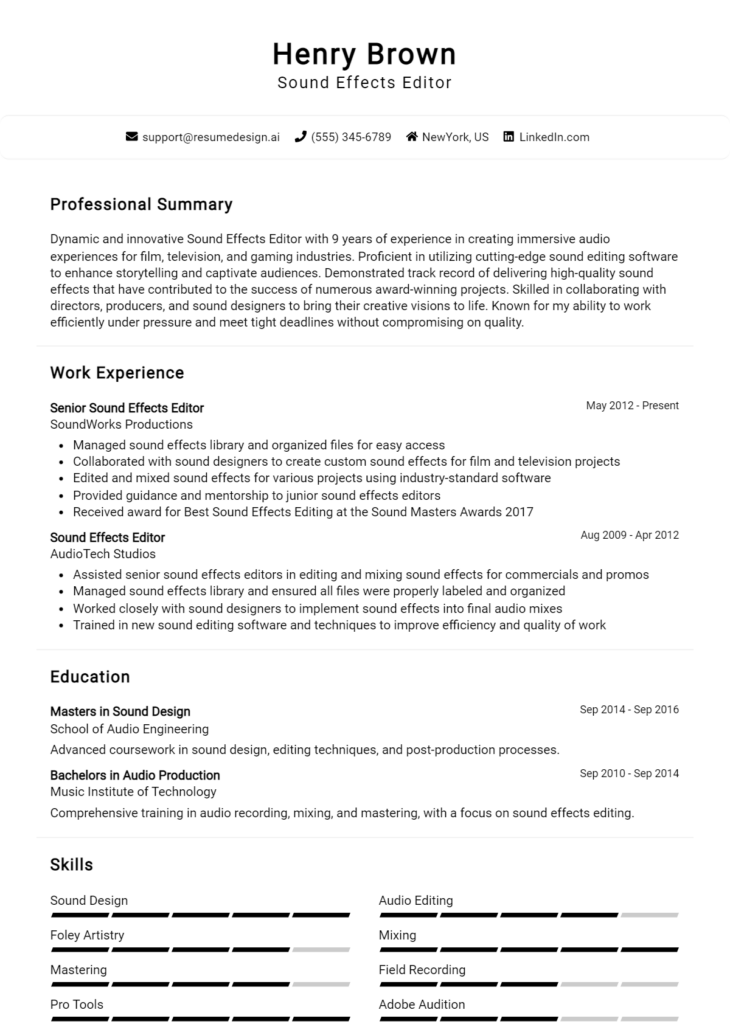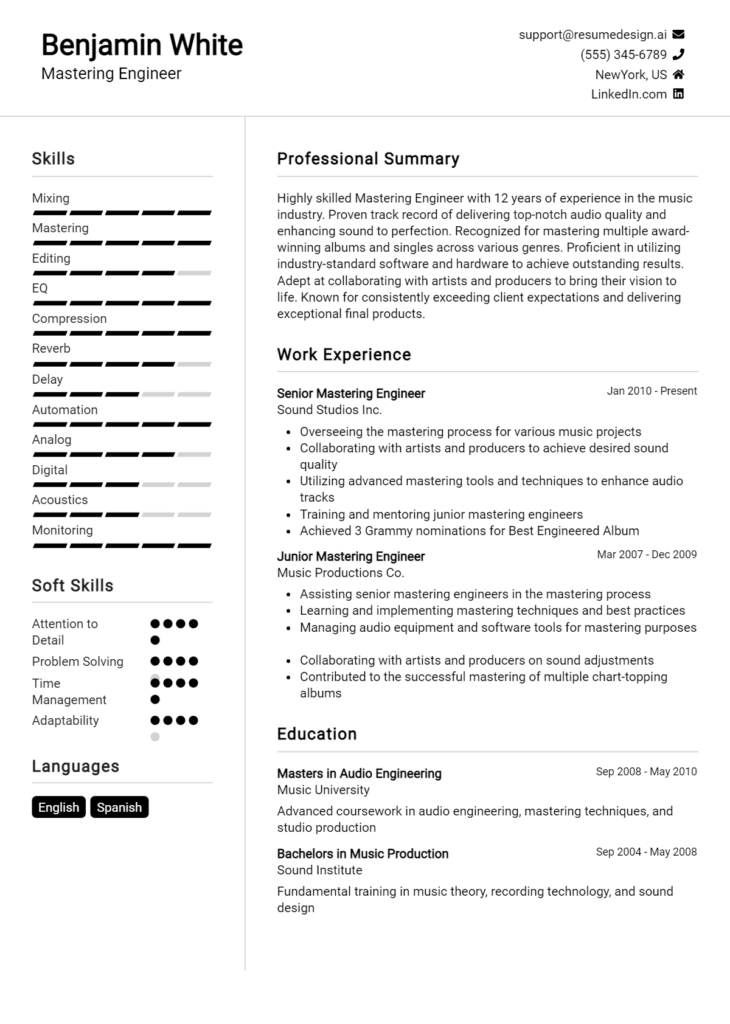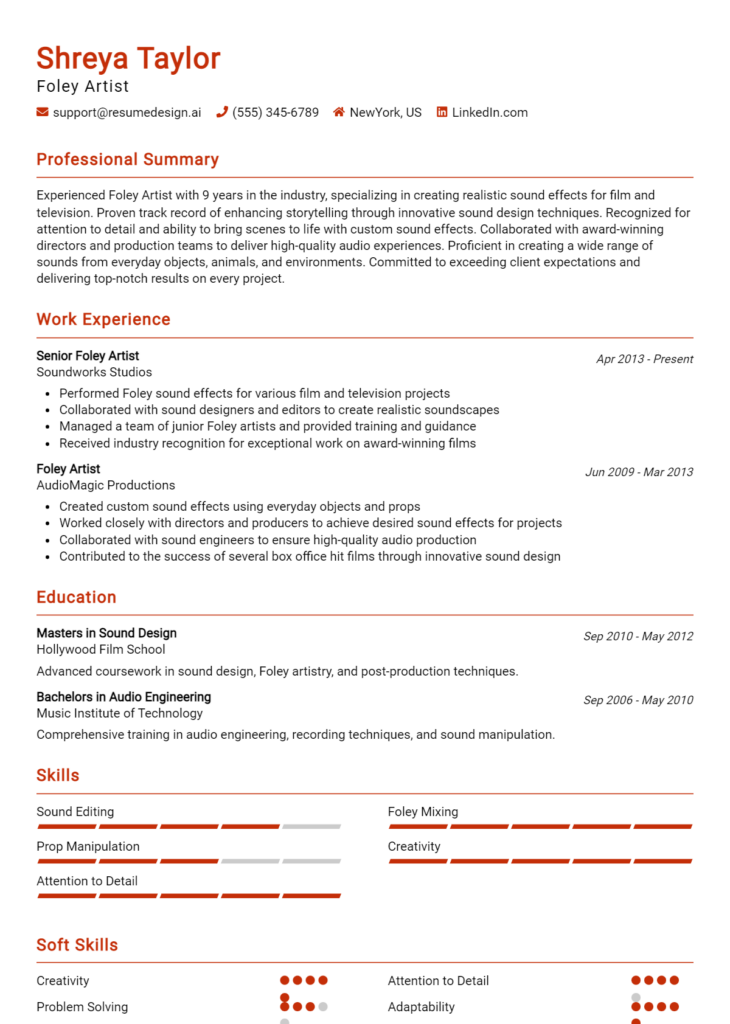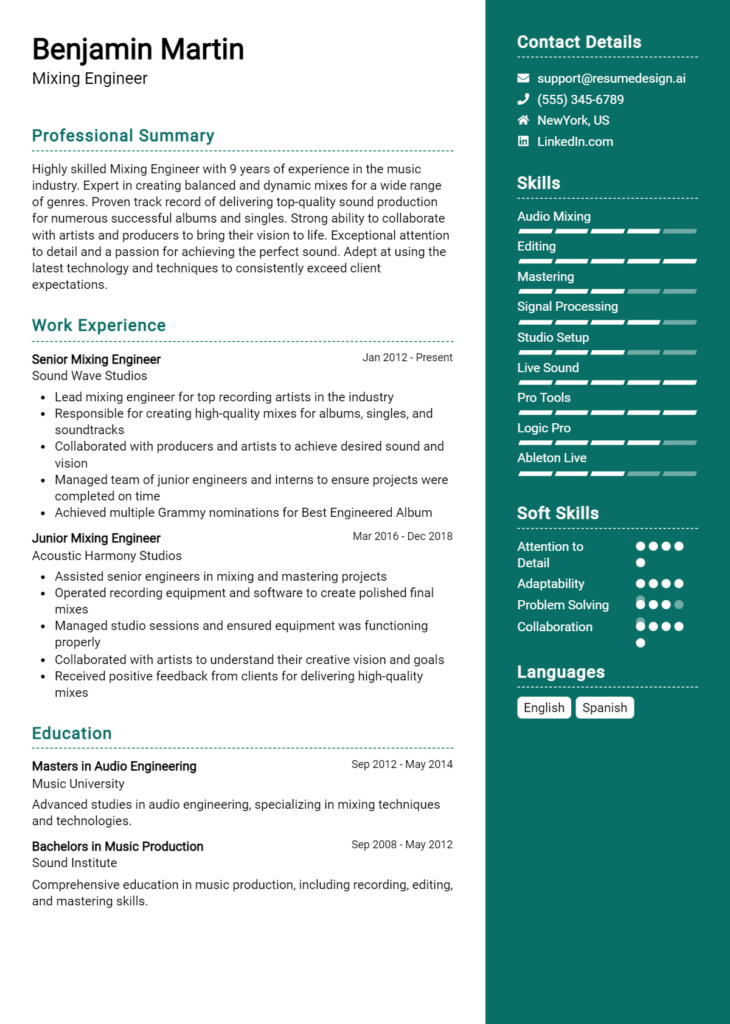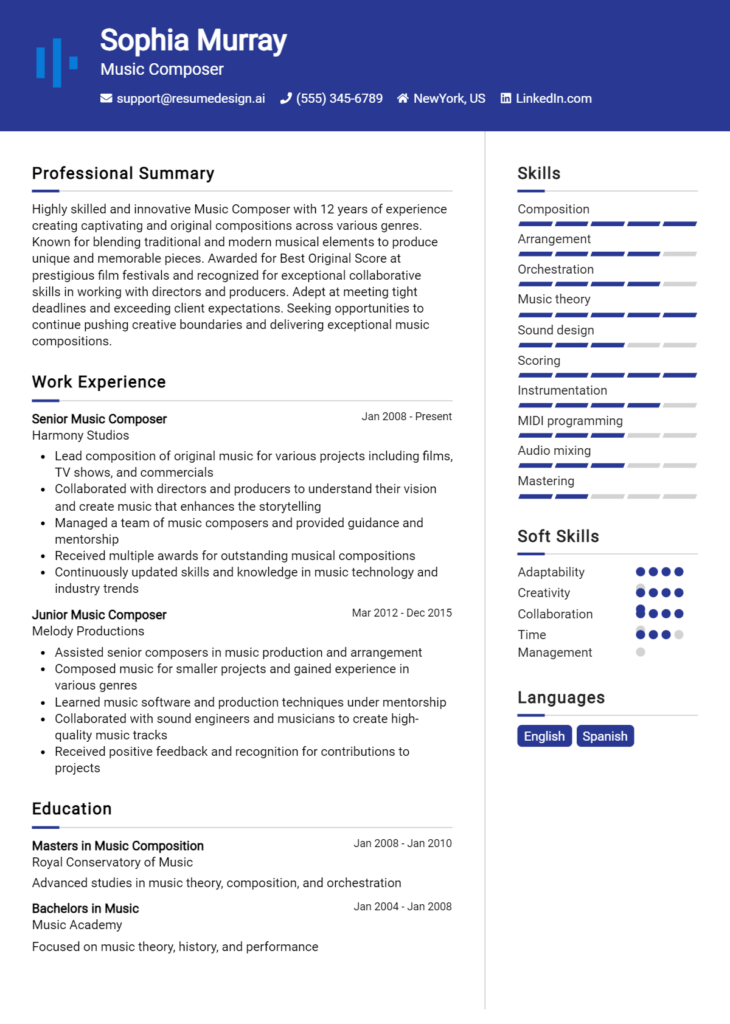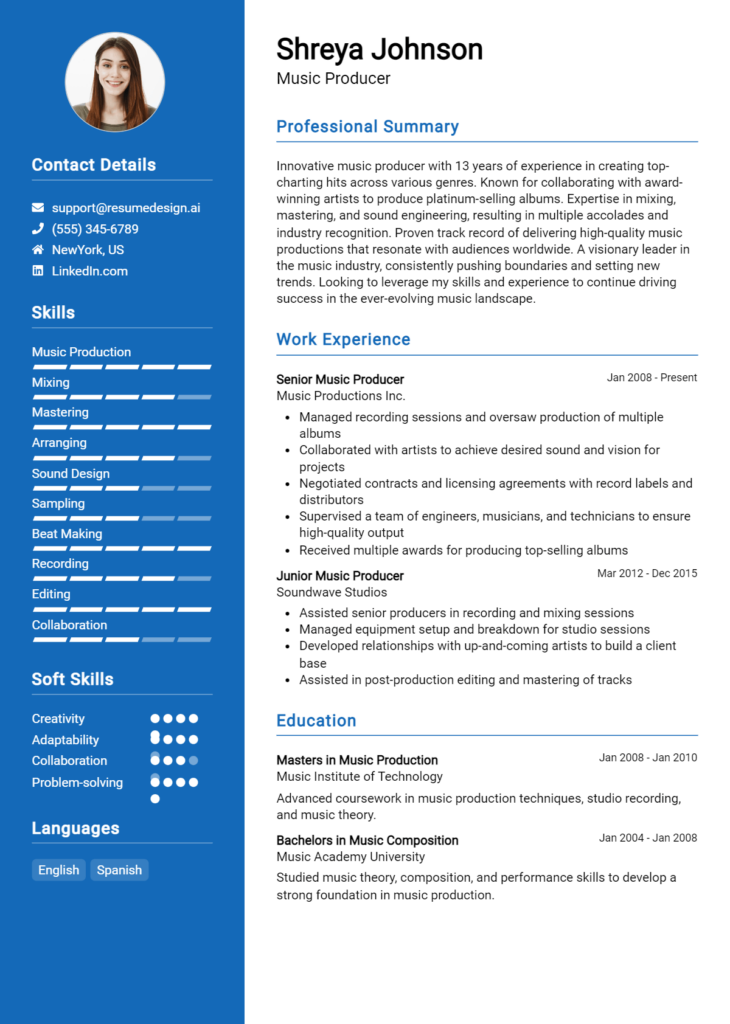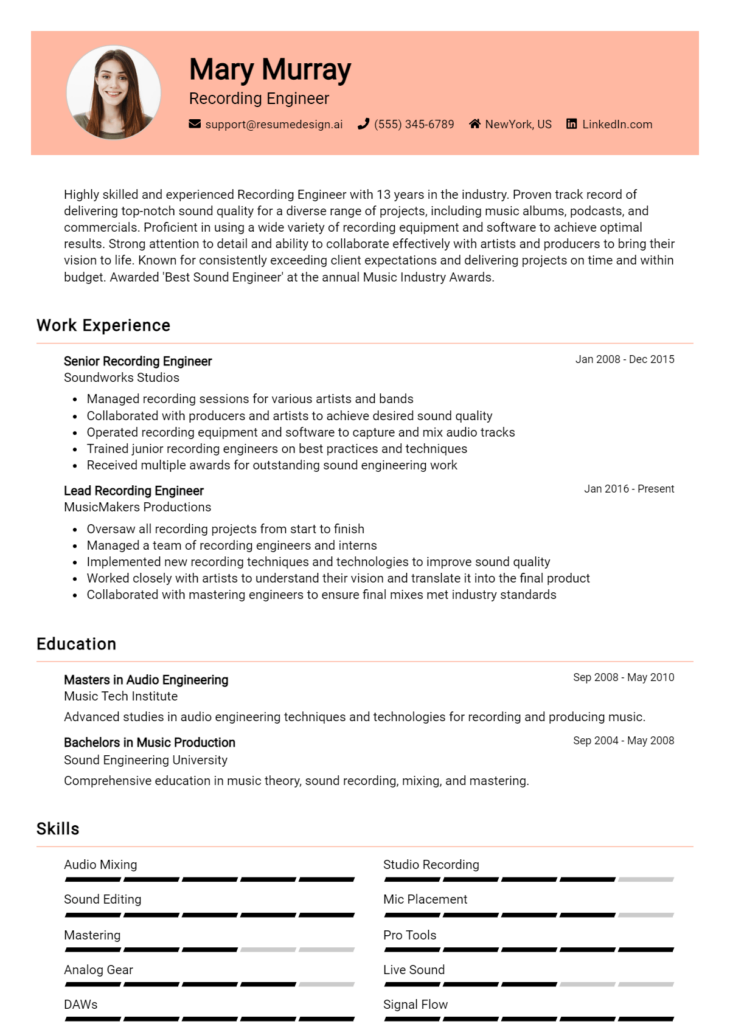Sound Engineer Core Responsibilities
A Sound Engineer plays a vital role in the production of audio content, collaborating closely with artists, producers, and technical teams. Key responsibilities include setting up and operating audio equipment, mixing and editing sound recordings, and ensuring optimal sound quality during live performances. Essential skills encompass technical proficiency in audio software, strong operational knowledge, and effective problem-solving abilities. These competencies not only enhance the overall sound experience but also align with the organization’s goals. A well-structured resume can effectively highlight these qualifications, showcasing a candidate's readiness to contribute to the team.
Common Responsibilities Listed on Sound Engineer Resume
- Setting up and testing audio equipment before recordings or events
- Mixing and editing audio tracks to achieve desired sound quality
- Collaborating with artists and producers to meet project specifications
- Troubleshooting technical issues during live performances
- Maintaining and repairing audio equipment
- Recording and processing sound effects and voiceovers
- Ensuring compliance with safety and industry standards
- Documenting audio setups and configurations for future reference
- Monitoring sound levels and making real-time adjustments
- Advising on acoustics and sound design for various projects
- Conducting sound checks prior to performances
- Managing audio budgets and resources efficiently
High-Level Resume Tips for Sound Engineer Professionals
For Sound Engineer professionals, a well-crafted resume is not just a document; it is a powerful marketing tool that can open doors to exciting career opportunities. This first impression is crucial, as potential employers often form their initial judgments based on the resume alone. A Sound Engineer's resume should effectively showcase both technical skills and notable achievements in the industry, capturing the essence of their expertise in sound design, mixing, and production. In this guide, we will provide practical and actionable resume tips specifically tailored for Sound Engineer professionals, ensuring that your application stands out in a competitive job market.
Top Resume Tips for Sound Engineer Professionals
- Tailor your resume to match the specific job description, highlighting relevant skills and experiences that align with the employer’s needs.
- Showcase your technical expertise by including industry-specific software and tools you are proficient in, such as Pro Tools, Logic Pro, or Ableton Live.
- Quantify your achievements by using metrics—such as the number of projects completed, clients served, or soundtracks produced—to demonstrate your impact.
- Highlight relevant experience, including internships, freelance gigs, and volunteer opportunities in audio production or live sound settings.
- Include a portfolio link to your best work, such as recordings, mixes, or projects that showcase your skills and creativity.
- List certifications or training relevant to sound engineering, such as courses in acoustics, audio editing, and sound design.
- Use action verbs to describe your responsibilities and accomplishments, making your contributions more dynamic and engaging.
- Keep the design clean and professional, ensuring easy readability and a layout that guides the reader's attention to key information.
- Incorporate keywords from the job posting to improve your resume’s visibility in applicant tracking systems (ATS).
- Proofread your resume multiple times to eliminate any spelling or grammatical errors, as attention to detail is crucial in the sound engineering field.
By implementing these tips, Sound Engineer professionals can significantly enhance their resumes, increasing their chances of landing a job in this competitive field. A well-structured and targeted resume not only showcases your qualifications but also demonstrates your commitment to the craft, making you a more attractive candidate to potential employers.
Why Resume Headlines & Titles are Important for Sound Engineer
In the competitive field of sound engineering, a well-crafted resume is essential for standing out among numerous applicants. Resume headlines and titles play a crucial role in this process, providing an immediate opportunity to capture the attention of hiring managers. A strong headline can succinctly summarize a candidate's key qualifications and set the tone for the entire resume. It should be concise, relevant, and directly related to the sound engineering position being applied for, serving as a compelling introduction that encourages the reader to delve deeper into the applicant's experience and skills.
Best Practices for Crafting Resume Headlines for Sound Engineer
- Keep it concise: Aim for one impactful phrase that encapsulates your qualifications.
- Make it role-specific: Use keywords relevant to sound engineering to align with the job description.
- Highlight key skills: Focus on your most impressive skills or achievements that relate to the position.
- Avoid jargon: Use clear and straightforward language that is easily understood by hiring managers.
- Be specific: Instead of generic titles, include specific areas of expertise, such as "Audio Mixing Specialist" or "Post-Production Sound Engineer."
- Showcase experience: If applicable, mention years of experience or notable projects in your headline.
- Use action-oriented language: Choose dynamic verbs that convey a sense of initiative and capability.
- Tailor for each application: Customize your headline for each job application to reflect the specific requirements of the position.
Example Resume Headlines for Sound Engineer
Strong Resume Headlines
"Award-Winning Sound Engineer with 10+ Years of Experience in Live Event Production"
“Creative Audio Specialist Skilled in Mixing and Mastering for Film and Television”
“Proficient Sound Designer with Expertise in 3D Audio Technology and Foley Art”
“Experienced Sound Engineer Focused on Quality and Innovation in Music Production”
Weak Resume Headlines
“Sound Engineer Looking for Work”
“Audio Professional”
“Seeking Opportunities in Sound Engineering”
The strong headlines are effective because they convey specific skills, years of experience, and a clear focus on the candidate's expertise within the field of sound engineering. They demonstrate a strong personal brand and immediately communicate value to potential employers. In contrast, the weak headlines fail to impress as they are vague and non-specific, lacking the necessary detail to differentiate the candidate from others. Without a clear message about the candidate’s unique qualifications, these generic titles do not engage hiring managers and may lead to missed opportunities.
Writing an Exceptional Sound Engineer Resume Summary
A well-crafted resume summary is crucial for Sound Engineers as it serves as the first impression to hiring managers. In a competitive job market, a strong summary quickly captures attention by succinctly showcasing key skills, relevant experience, and notable accomplishments that align with the job role. It should be concise, impactful, and tailored specifically to the position being applied for, allowing candidates to stand out and demonstrate their value in a matter of seconds.
Best Practices for Writing a Sound Engineer Resume Summary
- Quantify Achievements: Use numbers and metrics to illustrate your contributions and successes.
- Focus on Relevant Skills: Highlight technical and soft skills that are directly applicable to the sound engineering role.
- Tailor for Each Job: Customize your summary to reflect the specific requirements and keywords from the job description.
- Keep it Concise: Aim for 2-4 sentences that pack a punch without overwhelming the reader.
- Showcase Technical Expertise: Mention specific software, equipment, or techniques you excel in.
- Include Industry Experience: Reference your background in various settings, such as live events, studio work, or post-production.
- Highlight Collaboration Skills: Indicate your ability to work effectively with artists, producers, and other team members.
- Emphasize Problem-Solving: Mention instances where you've successfully overcome challenges related to sound engineering.
Example Sound Engineer Resume Summaries
Strong Resume Summaries
Dynamic Sound Engineer with over 8 years of experience in live sound production, specializing in mixing and mastering for diverse genres. Successfully led a team that increased event audio quality ratings by 30% through innovative sound design techniques.
Detail-oriented Sound Engineer with expertise in Pro Tools and Logic Pro, recognized for delivering high-quality recordings on tight deadlines. Achieved a 25% reduction in studio downtime by implementing efficient workflow processes.
Creative Sound Engineer with a proven track record in both studio and live environments, having mixed sound for over 100 live performances. Enhanced production value by integrating cutting-edge technology, resulting in a 40% increase in audience engagement.
Weak Resume Summaries
Experienced Sound Engineer looking for opportunities in audio production.
Sound Engineer with a background in music and sound. Good at working with others.
The strong examples are considered effective because they provide specific achievements, quantify results, and directly relate to the needs of the job role. They highlight relevant skills and experiences, making a compelling case for the candidate's qualifications. In contrast, the weak examples are vague and lack any measurable outcomes or specific skills, making them less impactful and memorable to hiring managers.
Work Experience Section for Sound Engineer Resume
The work experience section of a Sound Engineer resume is a critical element that illustrates the candidate's technical skills, leadership capabilities, and ability to produce high-quality audio products. This section not only highlights the practical experience gained over the years but also emphasizes the candidate's proficiency in managing teams, coordinating projects, and meeting industry standards. Quantifying achievements—such as successful project completions, budget management, and team performance—can significantly enhance the appeal of the resume, showcasing the candidate's impact in previous roles and aligning their experience with the expectations of potential employers.
Best Practices for Sound Engineer Work Experience
- Use specific technical terminology relevant to sound engineering, such as software and equipment used.
- Quantify achievements with metrics, such as percentage improvements in sound quality or budget savings on projects.
- Highlight leadership roles, including team management and project oversight responsibilities.
- Detail collaborative efforts with artists, producers, and other engineers to demonstrate teamwork.
- Include relevant certifications or specialized training that enhances your technical expertise.
- Showcase a diverse range of experiences across different genres or types of audio production.
- Tailor your work experience to reflect the specific requirements of the job you are applying for.
- Focus on results-driven outcomes, emphasizing how your contributions led to successful project completions.
Example Work Experiences for Sound Engineer
Strong Experiences
- Led a team of five engineers in the production of a major live concert, resulting in a 30% increase in audience satisfaction scores based on post-event surveys.
- Implemented a new audio mixing technique that reduced post-production time by 25%, saving the studio over $10,000 in labor costs.
- Collaborated with a cross-functional team to develop a sound design for an award-winning film, which earned a nomination for Best Sound at the XYZ Film Festival.
- Managed the installation of a state-of-the-art sound system for a new recording studio, achieving a 40% improvement in sound clarity as measured by industry-standard tests.
Weak Experiences
- Worked on various sound projects.
- Assisted in the recording process.
- Performed sound checks for events.
- Helped with mixing audio tracks.
The examples listed as strong experiences demonstrate clear, quantifiable outcomes and specific contributions that showcase technical expertise and effective collaboration. In contrast, the weak experiences lack detail and measurable achievements, making them less impactful and failing to convey the candidate's true capabilities or involvement in significant projects. Focusing on concrete results and clearly defined roles can significantly enhance the effectiveness of a resume in the sound engineering field.
Education and Certifications Section for Sound Engineer Resume
The education and certifications section of a Sound Engineer resume plays a crucial role in showcasing a candidate's academic background and industry-specific qualifications. This section not only outlines formal education but also highlights relevant certifications and specialized training that demonstrate a commitment to continuous learning. By providing details on coursework that aligns with sound engineering principles, as well as any recognized certifications, candidates can significantly enhance their credibility and demonstrate their alignment with the job requirements. A well-structured education and certifications section can set a candidate apart in a competitive job market.
Best Practices for Sound Engineer Education and Certifications
- Include relevant degrees from accredited institutions, such as a Bachelor's in Audio Engineering or Music Production.
- Highlight industry-recognized certifications, such as Pro Tools Certification or Avid Certified User.
- Provide detailed descriptions of relevant coursework that align with sound engineering skills and technologies.
- Emphasize any specialized training programs or workshops attended that are pertinent to the role.
- Use clear formatting to organize educational qualifications and certifications for easy readability.
- Update the section regularly to include any new qualifications or certifications acquired.
- Tailor the education and certifications section to match the specific requirements of the job posting.
- Consider adding honors or awards received during study that may bolster your application.
Example Education and Certifications for Sound Engineer
Strong Examples
- Bachelor of Science in Audio Engineering, University of California, Los Angeles (UCLA), 2020
- Pro Tools Certified Operator, Avid Technology, 2021
- Completed coursework in Advanced Mixing Techniques and Digital Sound Design
- Certificate in Sound Design for Interactive Media, Berkeley College, 2022
Weak Examples
- Bachelor of Arts in English Literature, State University, 2015
- Certification in Basic Computer Skills, Online Learning, 2019
- Completed a workshop on Public Speaking, Local Community Center, 2020
- High School Diploma, Anytown High School, 2010
The examples listed as strong are considered relevant and impactful because they directly relate to the skills and knowledge required for a sound engineering position, showcasing both formal education and industry-recognized certifications. In contrast, the weak examples lack relevance to the sound engineering field and demonstrate outdated or unrelated qualifications that do not support the candidate's suitability for the role. This distinction is essential for effectively communicating a candidate's qualifications to potential employers.
Top Skills & Keywords for Sound Engineer Resume
A well-crafted resume is essential for a Sound Engineer to stand out in a competitive job market. The skills section of your resume is particularly important, as it showcases your technical expertise and personal attributes that align with the demands of the role. Highlighting both hard and soft skills can give potential employers a comprehensive view of your qualifications and how you can contribute to their projects. By strategically selecting relevant skills, you not only demonstrate your proficiency in sound engineering but also your ability to work collaboratively and adapt to various environments.
Top Hard & Soft Skills for Sound Engineer
Soft Skills
- Strong communication skills
- Attention to detail
- Problem-solving abilities
- Team collaboration
- Time management
- Creativity
- Adaptability
- Critical thinking
- Customer service orientation
- Patience
Hard Skills
- Proficiency in audio editing software (e.g., Pro Tools, Logic Pro)
- Knowledge of acoustics and soundproofing techniques
- Experience with live sound reinforcement systems
- Familiarity with various microphones and their applications
- Skill in mixing and mastering audio
- Understanding of signal flow and routing
- Ability to troubleshoot audio equipment
- Experience with field recording techniques
- Knowledge of MIDI and music production
- Familiarity with digital audio workstations (DAWs)
Enhancing your resume with a balanced combination of skills can significantly improve your chances of landing an interview. Additionally, showcasing your relevant work experience will further solidify your qualifications and expertise in the sound engineering field.
Stand Out with a Winning Sound Engineer Cover Letter
Dear [Hiring Manager's Name],
I am writing to express my enthusiasm for the Sound Engineer position at [Company Name] as advertised on [where you found the job listing]. With a robust background in audio production, mixing, and live sound engineering, coupled with a passion for creating high-quality soundscapes, I am excited about the opportunity to contribute to your team. My experience working with diverse genres and in various settings has equipped me with the technical skills and creative insight necessary to excel in this role.
Throughout my career, I have honed my abilities in both studio and live environments, ensuring that every project I undertake meets the highest standards of sound quality. At [Previous Company Name], I successfully managed audio for multiple live events, collaborating closely with artists and production teams to deliver seamless performances. My proficiency with industry-standard software, including Pro Tools and Logic Pro, along with my hands-on experience with a variety of audio equipment, allows me to adapt quickly to different settings and challenges. I pride myself on my meticulous attention to detail and my ability to troubleshoot issues in real-time, ensuring that the audience receives an outstanding auditory experience.
I am particularly drawn to [Company Name] because of your commitment to innovation and excellence in audio production. I am eager to bring my background in sound engineering and my dedication to pushing creative boundaries to your team. I am confident that my skills in sound design and my collaborative spirit will help elevate your projects and contribute to the continued success of your organization.
Thank you for considering my application. I look forward to the opportunity to discuss how my experience and passion for sound engineering align with the goals of [Company Name]. I am excited about the possibility of contributing to your team and helping to create unforgettable audio experiences.
Sincerely,
[Your Name]
[Your Contact Information]
Common Mistakes to Avoid in a Sound Engineer Resume
When crafting a resume for a sound engineer position, many applicants overlook critical elements that can significantly impact their chances of landing an interview. A well-structured and tailored resume is essential for showcasing your technical skills and experience in a competitive field. However, certain common mistakes can hinder your presentation and fail to highlight your qualifications effectively. Here are some pitfalls to avoid when creating your sound engineer resume:
Generic Objective Statements: Using a vague objective that doesn’t specify your goals or the value you bring can make your resume blend in with others. Instead, tailor your objective to reflect your skills and aspirations related to the sound engineering role.
Neglecting Technical Skills: Sound engineering requires a range of technical competencies. Failing to list relevant software, equipment, and techniques can leave hiring managers questioning your qualifications. Be sure to include industry-standard tools like Pro Tools, Logic Pro, or Ableton Live.
Overloading with Jargon: While it's important to demonstrate your expertise, using excessive technical jargon can alienate readers who may not be familiar with specific terms. Aim for a balance that communicates your knowledge without overwhelming the reader.
Ignoring Relevant Experience: Many candidates focus solely on formal job roles and neglect freelance work, internships, or volunteer positions that can showcase their skills. Include all relevant experience to present a comprehensive view of your capabilities.
Lack of Quantifiable Achievements: Simply listing job duties doesn’t effectively convey your impact. Use numbers and specific outcomes to demonstrate your contributions, such as "improved sound quality for live events, resulting in a 20% increase in audience satisfaction ratings."
Inconsistent Formatting: A cluttered or inconsistent resume can distract from your qualifications. Ensure that your formatting is uniform, with clear headings, bullet points, and consistent font choices to enhance readability.
Omitting Soft Skills: While technical skills are crucial, soft skills like communication, teamwork, and problem-solving are equally important in a collaborative environment. Highlighting these skills can differentiate you from other candidates.
Failing to Proofread: Typos and grammatical errors can undermine your professionalism. Always proofread your resume multiple times, or ask someone else to review it, to ensure it is polished and error-free.
By avoiding these common mistakes, you can create a compelling resume that effectively showcases your strengths as a sound engineer and improves your chances of getting noticed by potential employers.
Conclusion
As a Sound Engineer, your expertise in audio technology, production techniques, and sound design is crucial for creating high-quality audio experiences across various media. Throughout the article, we've explored the essential skills required for the role, including proficiency in mixing, mastering, and the ability to work with different sound equipment. We also highlighted the importance of collaboration with artists, producers, and other professionals in the industry to achieve the desired auditory outcome.
In summary, emphasizing your technical skills, creativity, and teamwork abilities on your resume is key to standing out in this competitive field. As you prepare to advance your career as a Sound Engineer, we encourage you to review your resume carefully.
Take advantage of the various resources available to enhance your application materials, such as resume templates, which can provide you with a professional layout; the resume builder, which simplifies the process of creating a tailored resume; resume examples to inspire and guide you; and cover letter templates to help you craft a compelling introduction to your potential employers. Start refining your resume today and take the next step towards achieving your career goals in sound engineering!

